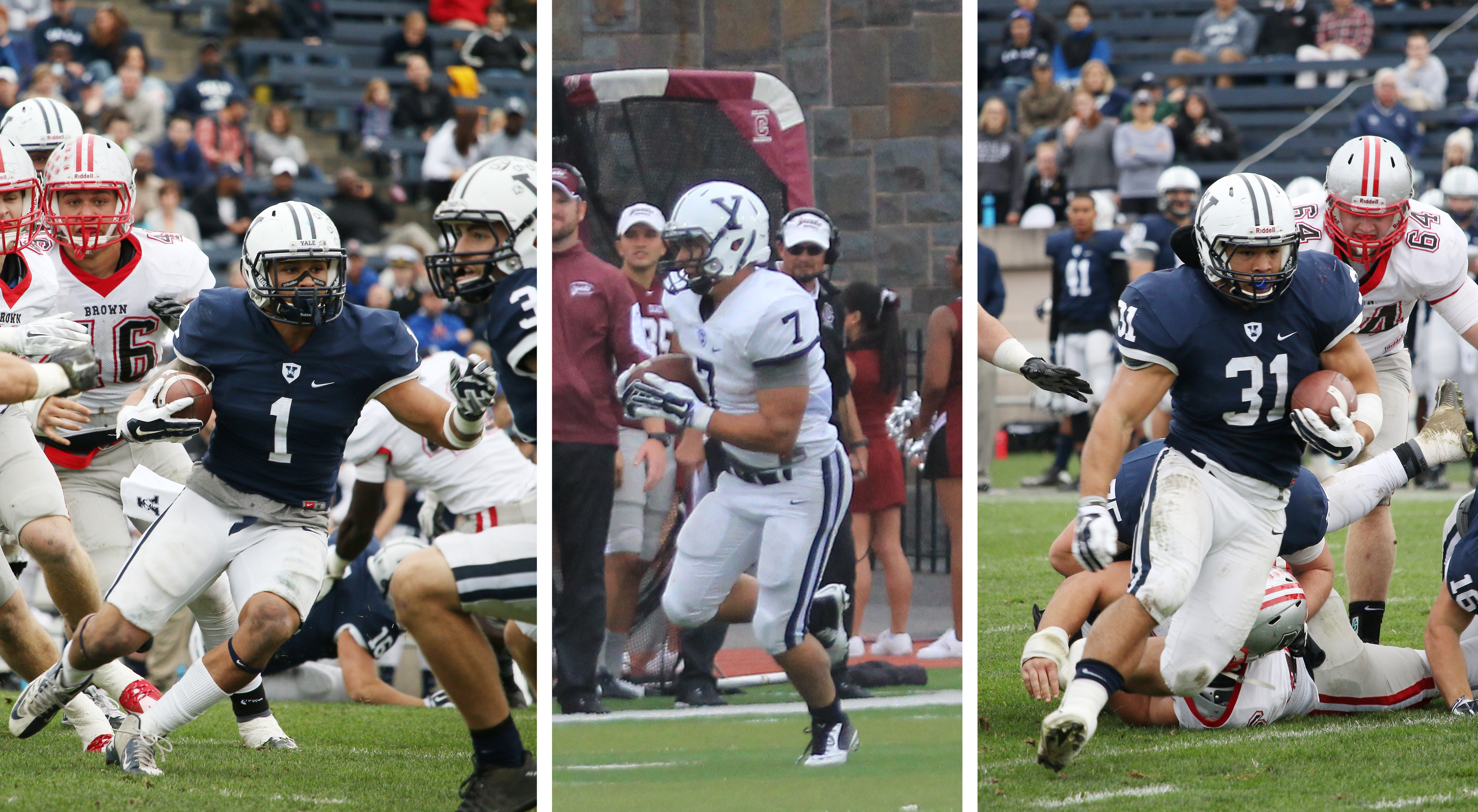
This story is part of the Yale football 2016 season preview issue. For the preview article, click here, and to read about the team’s recent changes in the secondary, click here.
Over the last two seasons, the Yale football team’s run game has nearly covered the full realm of possibility.
While the 2014 Bulldogs’ offense, anchored by two-time All-Ivy First-Team back Tyler Varga ’15, led the Ivy League with nearly 250 rushing yards per game and 29 rushing touchdowns in the team’s 8–2 campaign, last year’s squad managed just half of those totals, dealing with a glut of injuries en route to an underwhelming 3–4 finish in the Ancient Eight.
This fall, Team 144 has the tools to create yet another version of a formidable ground attack. With a committee of three veteran running backs, Dale Harris ’17, Candler Rich ’17 and Deshawn Salter ’18, each rusher will play an integral role in a multifaceted offensive system.
“We’ve got three guys who were all Ivy League Player of the Week at one point in time,” head coach Tony Reno said at a Tuesday press conference. “You can put them in any order you want … They’ll all play.”
Having battled a barrage of injuries last season, the Elis were forced to rely on their running backs on a next-man-up basis. Rich, the starter in the 2015 opener against Colgate, played in just two contests before undergoing season-ending surgery for an upper-body injury. Salter assumed the starting position thereafter and Harris joined the mix in Week 8. However, both suffered setbacks during the season due to neck and ankle woes, respectively.
This year, the three backs will return to the field in tandem and at full strength. Avoiding injuries at the position will be crucial for the Bulldogs’ offense, especially this season. It is likely that the veteran ground game will be called upon even more in 2016 to take pressure off whichever fresh face or faces replace Morgan Roberts ’16, the all-time leading passer in Yale history, at quarterback.
“If we had a perfect scenario, we’d run the ball 60 times and [the three running backs would] each have 20 carries,” Reno said. “They bring different things to the table.”
Harris came to Yale as a cornerback and spent the majority of the past two seasons starting at that position before moving to the backfield to provide depth. The Brooklandville, Maryland native is considered one of the fastest players on the team, and flashed his talent immediately.
After being handed a key spot in the rushing game, Harris averaged 5.4 yards per carry and amassed 281 total yards over the final three games of the season. 177 of those yards came in a 35–28 come-from-behind win against Princeton in Yale’s penultimate game.
Rich’s productivity in 2015, unlike Harris’, was limited to the start of the season. The then-junior starter tallied 78 yards and a touchdown against the Raiders in Week 1, but was unable to gain much additional momentum before an injury in his second start sidelined him for the remainder of the season.
Though Rich was unable to put together a full junior campaign, he has proven his ability to carry the ball effectively in the past. Playing behind the eventual Indianapolis Colt Varga, Rich compiled a stellar 2014 season, torching opposing defenses for 7.5 yards per attempt en route to All-Ivy Honorable Mention status.
Whereas Harris and Rich are known for being able to break off big runs, the third cog in the tailback machine will be what Reno refers to as a “hammer.”
Listed at 5-foot-10, 212 pounds, though Reno stated his weight to be at 230, Salter is the biggest back on the roster and the most utilized member from the 2015 rushing core. The Syracuse, New York native led the team with 561 rushing yards and seven touchdowns in nine games last season. Salter burst onto the scene in his first career start, a 233-yard and two-touchdown dismantling of Lehigh, representing the second-most rushing yards in a game by a Yale sophomore in Bulldog history.
Despite etching his own name in the record books last season, Salter, alongside his teammates, still found room for improvement over the summer.
“A lot of the offseason was focused on getting bigger and stronger as a team,” Salter said. “This year I’ll have a few extra pounds behind me which I hope will be beneficial in my game.”
The Yale backfield’s first chance to impress will be this Saturday, against what was a very stout-run defense last season for Colgate. The Raiders held Yale to 72 rushing yards in last year’s matchup, 50 yards fewer than the Elis’ 2015 average.







